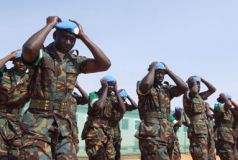UN chief urges quick deployment of Darfur troops
January 7, 2008 (UNITED NATIONS) — The situation is deteriorating in the western Sudanese region of Darfur and an existing peacekeeping force is too small to deal with it, U.N. Secretary-General Ban Ki-moon said on Monday.
 Last week a joint U.N.-African Union (AU) mission took over peacekeeping in Darfur from a purely AU force, seeking to end almost five years of fighting. But the swapping of green AU berets for U.N. blue ones is unlikely to bring rapid change.
Last week a joint U.N.-African Union (AU) mission took over peacekeeping in Darfur from a purely AU force, seeking to end almost five years of fighting. But the swapping of green AU berets for U.N. blue ones is unlikely to bring rapid change.
“I as the secretary-general and the United Nations as a whole … must ensure the rapid deployment of hybrid operations as agreed to the level of 26,000 (peacekeepers) as soon as possible,” Ban told reporters at his first news conference of 2008.
“We have now 9,000 re-hatted soldiers in Darfur. That’s not sufficient. That is why we are very concerned about the ongoing deteriorating situation in Darfur.”
The so-called hybrid force of AU and U.N. troops replaces a struggling AU mission. The plan is for it ultimately to comprise 20,000 soldiers and 6,000 police, but only a little over a third of those are so far in place.
Ban did not give details on the deterioration. However, a U.N. report seen by Reuters in Khartoum on Monday said Chadian planes have bombed Chadian rebel positions near Darfur’s capital, the second such reported cross-border incursion.
The Security Council also expressed its concern today at the rise in the activities of illegal armed groups in western Darfur and eastern Chad, leading to a surge in tensions.
In a statement read to the press by Ambassador Giadalla Ettalhi of Libya, which holds the Council’s rotating presidency for January, the 15-member body called on the two nations “to exercise restraint and pursue dialogue and cooperation” and to adhere to past agreements.
International experts say around 200,000 people have died in Darfur. The Sudanese government puts the death toll at 9,000 and says the West exaggerates the conflict involving Khartoum troops, government-allied militias and Darfur rebels.
PEACE EFFORTS
Ban said he spoke by telephone with Sudanese President Omar Hassan al-Bashir last week and planned to meet with him in person at an upcoming AU summit in Addis Ababa.
He added that it was crucial for Khartoum to live up to its promises regarding the status and composition of the joint force, whose deployment was approved by the U.N. Security Council on July 31.
Bashir has opposed non-African troops, delayed allocating land to the force, demanded the right to disable the mission’s communications during “security operations” and refused night flights.
Ban made it clear that the international community, too, must help the deployment by providing necessary helicopters and other heavy transport vehicles seen as vital for the mission to function effectively in a region the size of France.
The secretary-general has called for a genuine cease-fire and for all parties to return to talks. The latest round of talks was held in Libya in October but fizzled out after major rebel groups boycotted them.
Ban said the United Nations was looking at the possibility of a “second peace process” — a new round of talks — but added that this might take some time to organize.
(Reuters)
